Memoirs & Diaries - A Night Counter-attack
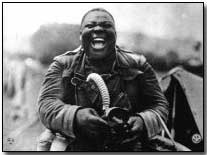 On Sunday, May 21st, 1916,
the battalion was in camp Camblain-l'Abbe, behind Vimy Ridge. Recent
spells in the line had been quiet, the weather was warm and sunny, and
everyone was in good spirits. I was on camp-cleaning fatigue, but, the
camp being in a good condition, there was nothing to do beyond picking up an
odd piece of paper or two.
On Sunday, May 21st, 1916,
the battalion was in camp Camblain-l'Abbe, behind Vimy Ridge. Recent
spells in the line had been quiet, the weather was warm and sunny, and
everyone was in good spirits. I was on camp-cleaning fatigue, but, the
camp being in a good condition, there was nothing to do beyond picking up an
odd piece of paper or two.
After dinner most of the men settled down in the hut to sleep or write letters; it was all very pleasant and happy, something like Sunday at home.
During the afternoon, when I happened to be near the officers' hut, the company commander put his head out of a window (he was having a bath) and told me to let him know at once if any message came from Battalion Headquarters.
I did not think much about the matter and, so far as I knew no message came. About five o'clock we sat down to tea.
In my hut we had just drawn our rations from the dixies when the company commander appeared at the door and said in a strange voice, "Pack up immediately! Pack up immediately!" We swallowed our tea, put on our equipment and fell in outside. In half an hour the battalion was on the road, marching in the direction of the line.
When we met the other companies it was obvious from the faces of officers and men that something serious was afoot. The old hands, I suppose, guessed what was coming, but to me it was all new.
We came to the hamlet of Villers-au-Bois, and there rested in a field for perhaps an hour in the evening sunlight. The officers went away to receive orders. When they came back we took the road once more, my company leading the battalion.
As we left the hamlet some Engineers ran across the road in front of us and climbed a bank on the side, apparently to get a better view of something. One of them shouted to his comrades as we passed, "This way for the orchestra stalls!"
Emerging from a belt of trees, we saw what they were looking at. Across a level stretch of country, two or three miles wide, we saw the Ridge. I do not suppose that it is much of a height as hills go, but it dominated the landscape at all times, and that evening it was as awful a sight as could be imagined.
From end to end it was covered with a thick cloud of grey smoke, lit here and there by the twinkling flashes of shell-bursts. Seen across that peaceful-looking countryside it seemed unreal, fantastic, but there was no one so new to warfare that he did not know what it meant.
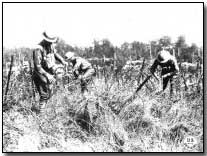 Before
long the sun set, and in the twilight we left the road and began to make our
way across country towards the Ridge.Half-way across we halted again and
waited for some time for a guide who was being sent down by the battalion
which was holding the line.
Before
long the sun set, and in the twilight we left the road and began to make our
way across country towards the Ridge.Half-way across we halted again and
waited for some time for a guide who was being sent down by the battalion
which was holding the line.
He came at length, and in the fading light we set off again. Presently I began to notice a smell which reminded me of pear-drops, and a smarting of the eyes which became so painful that I had to shut them at frequent intervals. I soon found that everybody else was suffering in the same way, and we concluded that the cause of the trouble was tear-gas.
The battalion had not experienced gas before, which accounted for our slowness in recognizing it. As soon as it was diagnosed we put on our goggles, but, what with the deepening gloom about us, the mist which gathered on the eye-pieces, and the roughness of the ground, we found that it was impossible to keep them on.
After a while, when we had passed through the "dosed" area, the symptoms passed off. Another stop, and a lot of argument in front. I heard the company commander say, with an intensity of feeling that only those who have been through such an experience will understand, "The bloody b-- of a guide has lost us!"
At length worn was passed along to move on again. We entered a shallow communication-trench. Night had fallen; we had to go in single file and soon experienced the usual trials of men moving in single file in darkness. The trench climbed a gentle rise; then we ran into an obstacle, a high step or sort of stile made of earth.
In daylight it would have been a trifle, no doubt, but that night it caused a great deal of anxiety and swearing. By this time it was obvious that we were nearing the line.
On the other side of the obstacle the ground fell away again, and ahead of us was another rise, the main Ridge, above which the enemy's flares rose every now and again and threw a sickly greenish light over the landscape for a few seconds.
The night was as black as ink; it was impossible to see more than a yard or so, except when a flare went up. Imagine a long line of hot and angry men stumbling along in utter blackness, everyone doing his best to keep up with the fellow in front yet not quite able to ignore the anxious cries from behind, "Where are you? We're losing touch!"
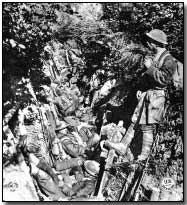 None
of us was familiar with the country, and every man knew that on him rested
responsibility for all those behind him.
None
of us was familiar with the country, and every man knew that on him rested
responsibility for all those behind him.
The man in front of me was a little fellow about fifteen years older than most of us and several degrees above us in social standing. He was said to be a First Division Civil Servant. Being short, he found even greater difficulty than the rest of us.
I well remember seeing him climb the step and almost fall down the other side into the darkness. It may be said that that was my last sight of him, for he was killed that night. The valley between us and the front line was being bombarded pretty heavily. We could hear shell after shell hurtling down into it, the scream of its passage and the roar of its explosion magnified by the echoes. On the height a couple of machine guns kept up a rat-tat-tat-tat.
Somehow the company got across the valley at last, and found itself lined up under a rise which led away up into the darkness. Here we halted again, while the Company Commander went into a small hut made of sand-bags, which served, I suppose, as the headquarters of the battalion in the line.
Shells thudded down and burst on the slope in front of us or shrieked over our heads. Presently word was passed along that every man was to take two bandoliers of ammunition in addition to the 120 rounds that were always carried. Boxes of ammunition appeared from somewhere and were opened; we each took a couple of bandoliers and hung the things round our necks. When all had been served word came along to fix bayonets. We fixed.
Then the order "Advance!" These orders were, of course, passed down from man to man in the good old Army fashion; we did not know from whom they came. We were somewhat bunched up at the start, so someone gave the order, "High Port!" The "high port" is a way of carrying a rifle above one's head, so that the bayonet fixed on it shall not accidentally stab one's neighbour.
It is used in drilling with bayonets fixed, but, of course, was not intended to be used under fire. The order may have come from anyone, a corporal or even some officious private, but we obeyed it. None of us, apart from the two officers and :he sergeant-major, knew what was happening.
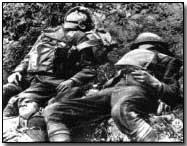 Opening
out as we moved up the slope, we came to a trench, which I knew later was
the British front line; to us it was simply an obstacle to be jumped into
and scrambled out of in the dark.
Opening
out as we moved up the slope, we came to a trench, which I knew later was
the British front line; to us it was simply an obstacle to be jumped into
and scrambled out of in the dark.
By this time we had come under machine-fire; the night seemed alive with bullets, whose crack, crack was almost deafening. As I got out of the trench I saw, by the light of a flare, our platoon-sergeant cursing some men who wanted to stop in it. He was threatening them with his bayonet and shouting, "Get out, you b--s!"
In front of the trench the attacking party seemed to melt away, and I soon began to feel rather lost, and strongly disinclined to go any further. I dropped into a shell hole with a half-hearted suggestion to myself that I only wanted to take stock of things for a minute. Another man got down into it at the same time who turned out to be my best chum. We exchanged some sort of greeting, and I soon discovered that he had no more desire to leave the hole than I had, which was some comfort for my conscience.
We crouched against the forward lip. Another minute or so, and the night seemed to turn red. Looking up, I saw almost over our heads a rocket which had burst into three red lights. I knew what that meant. It was the German S.O.S. signal to the artillery at that period.
I said "Good God! we're for it now!" The barrage came down on us. This time the shells were not going over, but coming close to us, and their shrieks rose to an almost unbearable pitch before they burst. Around us the world seemed to be shattered by explosion after explosion; the hellish crack of bullets went on unabated, and in front the lights danced continually up and down.
We cowered in our hole, our one object at the moment to take up as little space as possible. Bits of steel hummed over us, and dirt seemed to fall in showers. We heard afterwards that the enemy had a hundred batteries concentrated on a short bit of the line there; where the information came from I do not know, but I have never doubted it.
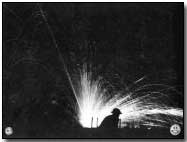 During
the bombardment something hit me in the back, and on putting my hand round
to feel the place I found it damp. I thought I had been wounded, but
found that the moisture was merely sweat, which was pouring down me as a
result of excitement.
During
the bombardment something hit me in the back, and on putting my hand round
to feel the place I found it damp. I thought I had been wounded, but
found that the moisture was merely sweat, which was pouring down me as a
result of excitement.
How long it went on I do not know-not many minutes, I suppose. When it had died down we peered out of our hole and discovered a few more fellows close by. It was necessary to decide what we were to do, for the darkness had begun to diminish. We held a consultation. You can imagine us lying there and looking anxiously at each other in the first dead light of dawn.
Some were for staying where we were, most for going back. We crawled out in the direction of our own lines and soon fell in with a lance-corporal who, to everybody's relief, endorsed the decision. So back we went over the broad crest of the Ridge to our front line and got into it. There we found two or three more of our fellows, with another lance-corporal, a big Devonian who was quite cool after the events of the night.
Under his encouragement we made a show of holding the line, though as far as we knew there were only thirteen of us. There were others away to right and left, but we did not see them until later in the morning.
When the sun rose I went exploring along the trench and found a short sap running forward from it; looking into this I saw another of my chums, a boy from Dublin, lying face downwards in the bottom and almost unconscious. He begged feebly for a drink. I believe I managed to moisten his lips, but I could not do much for him, because every time I tried to move him he groaned piteously.
There was a large hole in the upper part of his back, which I tried to cover with one of my field dressings. What I did was not of much avail, I fear, but it was the best I could do, as he kept begging me to leave him alone, and I suspected that in moving him I was doing more harm than good. I took out his pocket-book and copied the address on one of his letters from home, with the purpose of writing to his people, as it did not seem likely that he would be able to write letters for a long while.
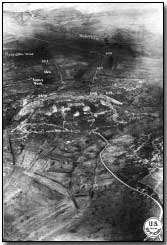 By
this time the sun shone brightly and we were in comparative peace; only the
occasional crack of a sniper's bullet reminded us that there was an enemy,
and after what we had just been through, snipers' bullets did not seem worth
worrying about. Later in the morning our little party was given
permission to go down to the valley again.
By
this time the sun shone brightly and we were in comparative peace; only the
occasional crack of a sniper's bullet reminded us that there was an enemy,
and after what we had just been through, snipers' bullets did not seem worth
worrying about. Later in the morning our little party was given
permission to go down to the valley again.
On the way we passed a number of wounded men whom we knew, waiting to be carried out. One of them, I was glad to see, was our platoon sergeant, a man I had always disliked. He had a wound in one of his feet. During the day we rested in holes and dug-outs under the lee of the hill and, apart from an hour's bombardment with high-explosive shells in the afternoon, the time passed pleasantly enough.
In the evening occurred two little incidents which have always puzzled me and will now, I suppose, never be explained. The first was a glimpse that I had of a headless corpse, or what appeared to be a headless corpse, sitting alone in a shallow dug-out. Looking for someone I knew, I put my head in and saw this thing; it gave me such a shock that I did not look again. How a headless corpse could be in that position and that place I cannot imagine.
The other incident occurred after dark. I was sitting in a big dug-out when a few more of the company came in. They had been lying in a shell hole in "No Man's Land" all day, expecting every moment to be blown to atoms by a trench-mortar. They did not dare to show a finger until nightfall, of course. One of them, who, though he had known me a long time, was not a chum of mine, was so moved at seeing me that he kissed me on the forehead.
The same night the battalion was relieved and returned to Camblain-l'Abbe. When the newspapers came up during the next few days, we looked eagerly for the official report of our adventure, but were bitterly disappointed, for the communiqué merely said that the situation on Vimy Ridge remained unchanged.
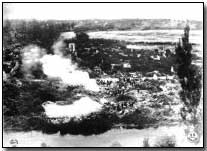 It
became known afterwards that when the company commander reported at the
headquarters of the battalion holding the line on the fatal night he was
told that the line of resistance and the support line had been captured by
the enemy and that he was to deliver a counter-attack in half-an-hour.
It
became known afterwards that when the company commander reported at the
headquarters of the battalion holding the line on the fatal night he was
told that the line of resistance and the support line had been captured by
the enemy and that he was to deliver a counter-attack in half-an-hour.
There was no time to make any reconnaissance, and no information was forthcoming as to the exact position of affairs. The company commander did his best, but it is not astonishing that the counter-attack was a failure. The commander and his only subaltern, their servants and the sergeant-major disappeared and were never heard of again. The company went into action 104 strong and came out with forty-eight.
My Dublin chum died in hospital in France about a month later, as I learnt from a letter sent by his brother.
Frank Wilfrid Watts enlisted June 1915 in 15th Battalion, The London Regt. (Civil Service Rifles). Lance-Corporal, October 1915. Corporal, December 1915. Lance-Sergeant, March 1916. Wounded at High Wood on September 15th, 1916. Commissioned in the same battalion, October 1917. To Palestine, March 1918. Returned to Belgium, July 1918. Wounded at Messines in September and sent home again. Discharged from hospital, March 1919.
First published in Everyman at War (1930), edited by C. B. Purdom.
Photographs courtesy of Photos of the Great War website.
Prevalent dysentery among Allied soldiers in Gallipoli came to be referred to as "the Gallipoli gallop".
- Did you know?
